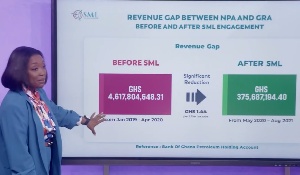- Home - News
- Elections 2024
- News Archive
- Crime & Punishment
- Politics
- Regional
- Editorial
- Health
- Ghanaians Abroad
- Tabloid
- Africa
- Religion
- Photo Archives
- Press Release
General News of Saturday, 24 May 2025
Source: www.ghanawebbers.com
Saboteurs see SML as a threat – Yaa Serwaa Sarpong
Dr. Yaa Serwaa Sarpong is the Director of Support Services at Strategic Mobilisation Ghana Limited (SML). She has criticized those who oppose the company’s operations. Dr. Sarpong believes SML's innovations have upset individuals benefiting from loopholes in Ghana's petroleum sector.
In an interview on The Upfront with Joy News, she described the backlash against SML as orchestrated. Those uncomfortable with SML’s role see it as a threat to their interests. By eliminating manual processes, SML frustrates those who exploited the system.
SML is a Ghanaian-owned company working with the Ghana Revenue Authority (GRA). It specializes in revenue assurance, real-time monitoring, and audit services in the petroleum downstream sector. Dr. Sarpong stated that SML’s technology has significantly reduced tax evasion opportunities.
Before SML's involvement, GRA relied on data reported by oil marketing companies. This system lacked independence and transparency. Now, they use check meters and satellite transmissions for accurate data collection.
“Every litre lifted is accounted for,” Dr. Sarpong explained. “All data is independently verifiable.” This change does not sit well with those who preferred less transparency.
Dr. Yaa Sarpong defended SML’s role amid scrutiny about its value in revenue monitoring. She emphasized that their systems represent true revenue assurance.
She challenged critics by highlighting the technological advancements and financial model introduced by SML. “If what we’re doing isn’t revenue assurance, then what is?” she asked.
SML funds its system development and operations independently. They receive compensation only from a portion of recovered revenue—5%—while the government retains 95%. This model is efficient and transparent compared to traditional arrangements.
Dr. Yaa Sarpong noted that before SML, GRA used paper-based documentation stored in sacks, making audits unreliable. “Today, automated systems and cloud storage have transformed this process,” she said.
This transformation enhances accountability and makes prosecutions easier than before.











